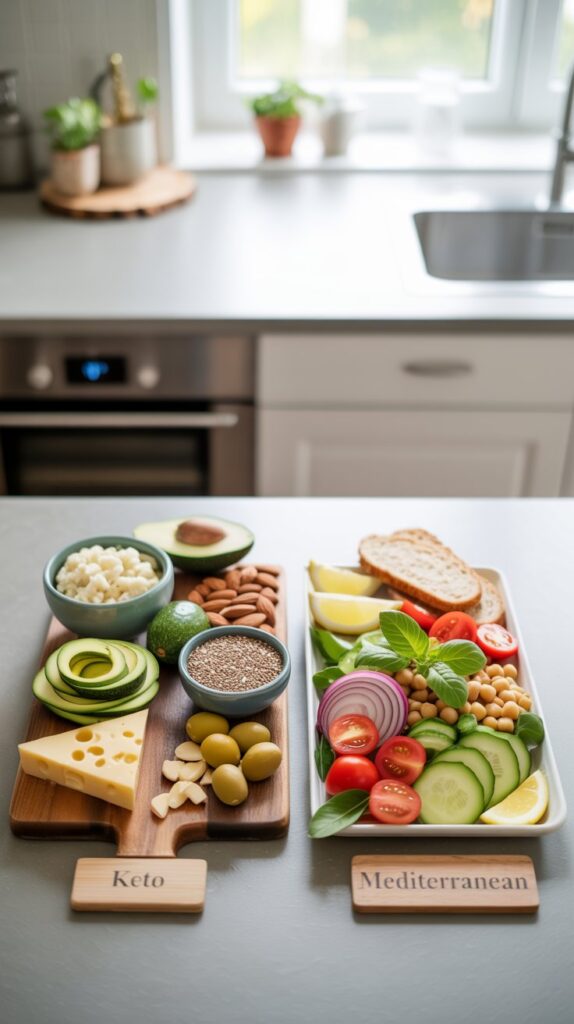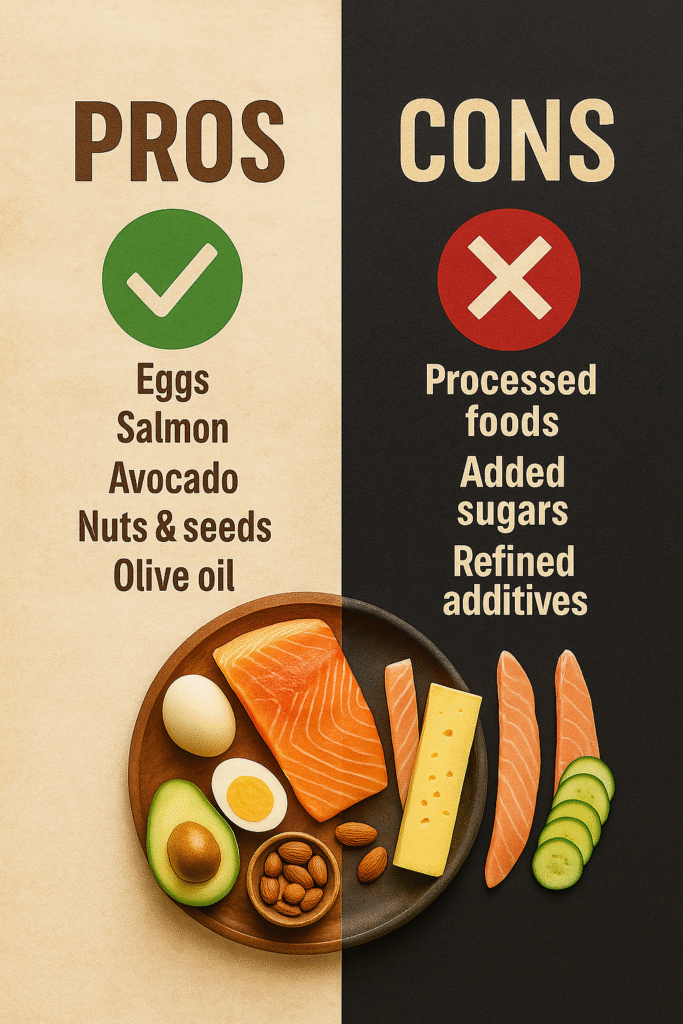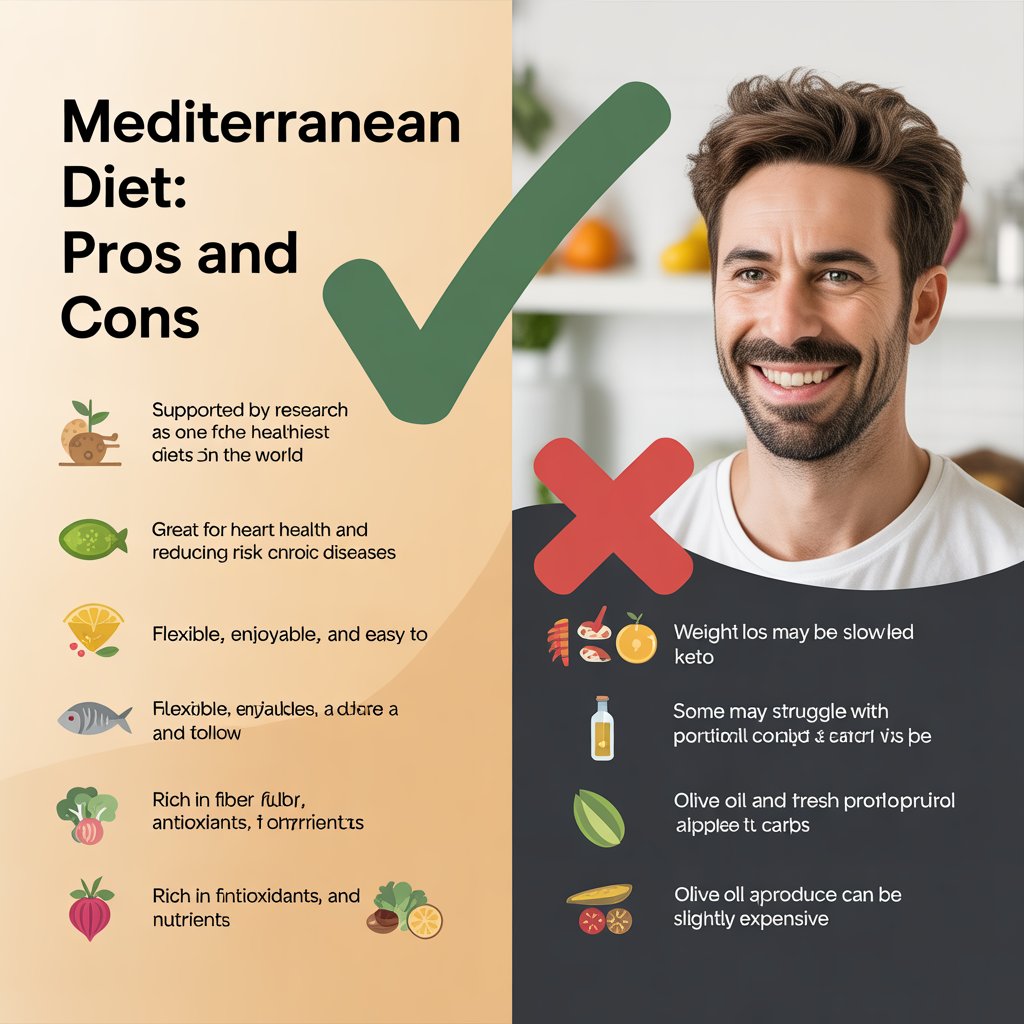When it comes to weight loss and healthy living, two diets often grab the spotlight Keto diet and the Mediterranean diet. Both are popular, both have loyal followers, but they are very different in approach. If you’re confused in Keto vs Mediterranean about which diet might suit you best, this blog will break it down step by step and helps you to understand both diets.

What is the Keto Diet?
The Ketogenic diet (Keto) is a low-carb, high-fat eating plan. The goal is to push your body into a metabolic state called ketosis, where it burns fat for energy instead of carbohydrates.
Key Features of Keto Diet
- Carbs are limited to 20–50 grams per day.
- About 70–75% of daily calories come from fat.
- Protein intake is moderate.
- Foods include: meat, fish, eggs, cheese, nuts, butter, and oils.
- Avoid: bread, rice, pasta, fruits (except berries), sugary drinks, and beans.
Keto is usually chosen for rapid weight loss and better blood sugar control.

What is the Mediterranean Diet?
The Mediterranean diet is based on the traditional eating habits of people living in countries near the Mediterranean Sea like Greece, Italy, and Spain. Unlike Keto, it is balanced, flexible, and sustainable.
Key Features of Mediterranean Diet (Keto vs Mediterranean)
- Focus on whole, minimally processed foods.
- Rich in fruits, vegetables, whole grains, legumes, and nuts.
- Healthy fats mainly from olive oil, avocados, and nuts.
- Moderate fish, poultry, and dairy.
- Very little red meat and processed foods.
- Red wine is often allowed in moderation.
The Mediterranean diet is considered heart-healthy and sustainable for long-term lifestyle changes.

Keto vs Mediterranean: Nutritional Comparison
| Category | Keto Diet | Mediterranean Diet |
| Carbs | Very low (20–50g/day) | Moderate (whole grains, fruits, beans) |
| Fats | Very high (70–75% calories) | Healthy fats (olive oil, nuts, fish) |
| Protein | Moderate (meat, eggs, cheese) | Moderate (fish, poultry, beans) |
| Fruits & Veggies | Limited (mostly low-carb veggies) | High intake, wide variety |
| Sustainability | Hard to follow long-term | Easier, more flexible |
| Weight Loss | Rapid, especially in the first months | Gradual but sustainable |
| Health Focus | Ketosis, blood sugar control | Heart health, longevity |
Keto Diet: Pros and Cons
✅ Pros:
- Quick weight loss results.
- Helps lower blood sugar and insulin resistance.
- Reduces appetite due to high fat intake.
❌ Cons:
- Difficult to stick to for long periods.
- May cause “Keto flu” (fatigue, headache, nausea) in the beginning.
- Lacks fiber, which can lead to digestion issues.
- Restrictive many favorite foods are off-limits.

Mediterranean Diet: Pros and Cons
✅ Pros:
- Supported by research as one of the healthiest diets in the world.
- Great for heart health and reducing risk of chronic diseases.
- Flexible, enjoyable, and easy to follow.
- Rich in fiber, antioxidants, and nutrients.
❌ Cons:
- Weight loss may be slower compared to Keto.
- Some may struggle with portion control since it allows carbs.
- Olive oil and fresh produce can be slightly expensive.

Which Diet is Better for Weight Loss? Keto vs Mediterranean?
- Keto Diet: Works faster in the short term because cutting carbs leads to quick fat burning and water loss. Many people see visible results in 2–3 weeks.
- Mediterranean Diet: Promotes steady and sustainable weight loss. It may take longer to see results, but they are more permanent.
If your goal is quick results, Keto might work. If your goal is long-term health and slow but steady weight loss, the Mediterranean diet is better.
Which Diet is Better for Heart Health? – Keto vs Mediterranean
- Keto: High fat intake, especially if coming from butter, cheese, or red meat, can raise LDL cholesterol in some people.
- Mediterranean: Backed by years of research for reducing risk of heart attack, stroke, and high blood pressure.
Winner: Mediterranean Diet.
Which Diet is Easier to Follow?
- Keto: Very restrictive; one small mistake (like eating bread or rice) can kick you out of ketosis.
- Mediterranean: Much more flexible and adaptable to everyday meals.
Winner: Mediterranean Diet.
Who Should Try Keto?
- People looking for rapid weight loss.
- Those struggling with insulin resistance or type 2 diabetes.
- People who can manage a strict eating plan.
Who Should Try the Mediterranean Diet?
- People aiming for long-term health.
- Those who want a balanced, enjoyable diet.
- Anyone focusing on heart health and overall well-being.
Expert Opinions
Most health experts recommend the Mediterranean diet over Keto for overall health, heart protection, and long-term lifestyle. Keto can be useful short-term but is not always sustainable.
FAQs About Keto vs Mediterranean Diet
1. Can you combine Keto and Mediterranean diets?
Yes, a “Mediterranean Keto” version exists low carb but still focuses on healthy fats like olive oil, nuts, and fish.
2. Which diet is more affordable?
Mediterranean is often cheaper as it includes grains, beans, and seasonal veggies, while Keto relies heavily on meat and dairy.
3. Is Keto safe long-term?
Not always. It may cause nutrient deficiencies if followed for too long without medical guidance.
4. Does Mediterranean diet include dairy?
Yes, but in moderation mainly cheese and yogurt.
5. Can vegetarians follow Keto?
Yes, but it’s harder since most protein sources are animal-based.
6. Is Mediterranean diet good for diabetics?
Yes, it helps control blood sugar without being too restrictive.
7. Which diet gives more energy?
Mediterranean diet generally provides more energy since it includes healthy carbs.
8. Will Keto cause muscle loss?
If protein intake is not sufficient, it may. Strength training helps prevent this.
9. Which diet is more family-friendly?
Mediterranean because it doesn’t restrict common foods like fruits, grains, and legumes.
10. Which diet is backed by more research?
Mediterranean diet has decades of studies proving its benefits. Keto is newer and still being researched long-term.
Conclusion: Keto vs Mediterranean – Which One Wins?
If you want fast weight loss and don’t mind strict rules, the Keto diet might be worth trying. But if you want a lifestyle change that supports long-term health, heart wellness, and sustainable weight management, the Mediterranean diet clearly takes the crown.
At the end of the day, the “best” diet is the one you can stick to consistently without feeling deprived. Thankyou and join team fat-fighter for more unique and helpful content on healthy lifestyle and fat loss. Our support Journey